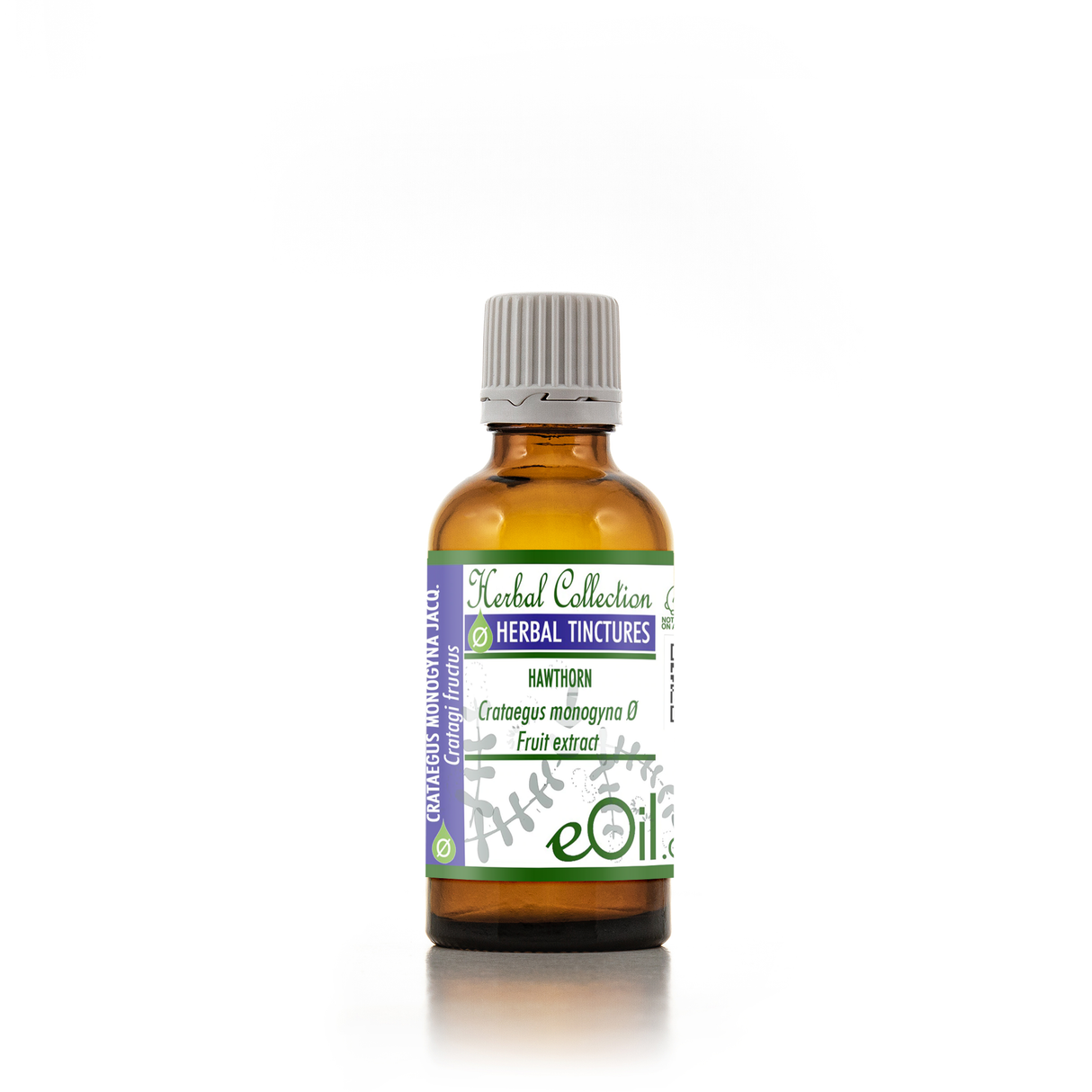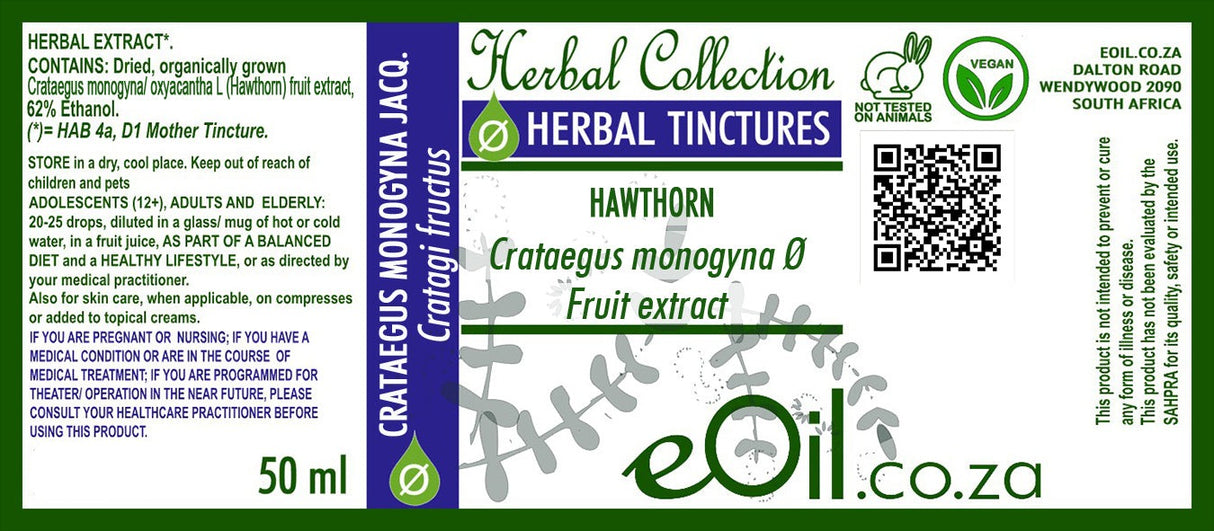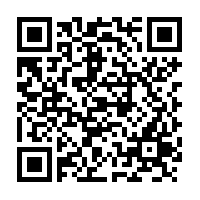Hawthorn berry - Liquid Herbal Extract
Hawthorn berry - Liquid Herbal Extract - 50 ML is backordered and will ship as soon as it is back in stock.
Description
Description
Understanding Mother Tinctures & Glycerines
Hawthorn Berry Liquid Herbal Extract tincture is made from Crataegus species, valued for their rich antioxidant and flavonoid content.
This gentle, alcohol-free extract preserves hawthorn’s traditional botanical properties and is suitable for daily wellness routines.
Ethically sourced and vegan-friendly, it supports general vitality and is ideal for adults seeking a natural lifestyle addition.
TRADITIONALLY USED FOR
May help with
Hawthorn – Loose Leaves & Berries Tinctures
What is Hawthorn?
Hawthorn (Crataegus spp.) is a traditional heart tonic, long used in European, Asian, and North American herbalism for cardiovascular, circulatory, and nervous system support. Both the leaves/flowers and the berries are prized for their distinct phytochemical profiles and therapeutic actions.
Hawthorn Leaves (Loose, Whole or Cut for Herbal Tea)
Description & Use
- Form: Dried, loose leaves (sometimes with flowers), food-grade.
- Preparation: Used in tisanes (herbal teas), often blended with flowers or berries.
- Traditional Dose: 1–2 tsp loose leaves per cup, steeped in hot water for 10–15 minutes, taken 1–3 times per day.
Key Benefits
- Cardiovascular Support: Improves cardiac tone, helps regulate blood pressure (mild effect), increases blood flow to the heart muscle, and may support healthy cholesterol levels.
- Antioxidant & Anti-inflammatory: Flavonoids (including vitexin, hyperoside, rutin), procyanidins, and other polyphenols neutralize free radicals, alleviate inflammation in blood vessels.
- Mild Relaxant: Used for nervous tension, anxiety, and sleep support, partly via circulatory benefit to the brain.
- Other Uses: Supports healthy circulation, especially with age; mild diuretic and digestive tonic.
How to Use
- Add 1–2 tsp to a cup of freshly boiled water, steep 10–15 min, strain and drink.
- May be combined with hawthorn berries, linden, or lemon balm for custom blends.
Hawthorn Berries – Tinctures
Description & Use
- Form: Alcohol extract (tinctures) of dried or fresh hawthorn berries, often with leaves/flowers for full-spectrum effect; also available as a vegan glycerite.
- Dose: Most tinctures are standardized to 1:2–1:5 (herb:alcohol), typical use is 1–2 ml (20–40 drops), up to 3 times/day in water or tea.
Key Benefits
- Heart & Circulation:
- Improves cardiac efficiency and contractility, supports blood vessel elasticity.
- Enhances coronary blood flow, helps modulate blood pressure (especially mild hypertension), may help with palpitations and exercise tolerance.
- Used in mild congestive heart failure as a supportive remedy.
- Cholesterol & Lipid Support: Contains oligomeric procyanidins and polyphenols linked with healthy lipid metabolism and arterial health.
- Antioxidant Rich: Berries are particularly high in proanthocyanidins, vitexin, and other polyphenols for cardiovascular and vascular protection.
- Calming Nervous System: Traditional use for stress, mild anxiety, and emotional heart symptoms.
How to Use
- Take 20–40 drops (1–2 mL) diluted in a little water or juice, 2–3 times per day.
- Consistent daily use over at least 6–8 weeks often recommended for cardiovascular effects.
Main Active Compounds & Mechanisms
- Flavonoids: Vitexin, hyperoside, rutin, quercetin – potent antioxidants.
- Proanthocyanidins/Oligomeric procyanidins: Support endothelial function, vessel tone, and heart contractility.
- Phenolic acids & triterpenes: Anti-inflammatory and antioxidant action.
- Tannins, saponins: Minor but contribute astringency and general toning effects.
Safety & Cautions
- Well-tolerated; large-scale studies confirm suitability for mild heart support, but always consult a medical professional before combining with prescription heart or blood pressure medication.
- Not for self-treatment of serious heart conditions—used as adjunct, not replacement for medical care.
- Side effects rare: Some may experience mild GI upset or headache.
- Safe at culinary/tea doses and standard tinctures amounts.
ummary Table
| Form | Use Highlight | Active Compounds | Typical Dose | Quality |
|---|---|---|---|---|
| Loose Leaves | Tea/tisane for heart tone, relax, circulation | Flavonoids, procyanidins | 1–2 tsp/cup, 1–3x/d | Vegan |
| Berries Tinctures | Heart support, mild BP, antioxidant | Procyanidins, flavonoids | 20–40 drops, 2–3x/d | Vegan |
Hawthorn is a traditional support, not a substitute for required cardiac care. Always consult with your doctor before changing your regimen.
INFORMATION
Source : http://www.wikiphyto.org/wiki/Aubepine
Reference on http://www.wikiphyto.org
Translation in English by Google Translate (go to the page of the source linked | on Chrome cellphones go on the 3 dots on the top right and select translate in your preferred language | on laptop right click your mouse and select option translate when hoovering on the page
plant name
Hawthorn, Whitethorn , Maythorn , cenelier , hawthorn (English)
International Latin denomination
Crataegus monogyna Jacq. and Crataegus laevigata (Poiret) DC (= Crataegus oxyacantha L.)
botanical family
Rosaceae
Description and habitat
- Bushy and thorny shrub, 3-4 m high, with lobed and shiny green leaves, white or slightly pink flowers, grouped in corymbs, fragrant. The fruit is a small red drupe called cenelle
- Hawthorn is common in hedgerows and woodlands throughout Europe, western Asia and northern Africa. It is naturalized in North America.
- Drought and cold increase the level of phenolic derivatives [1]
History and tradition
- Short and sharp spines ( oxus : sharp, akanta : thorn)
- It is in the wood of the hawthorn that one cut the logs of the tortured in the past
Parts used
- Flowering tops, fruits, buds
Dosage forms available
- Flowering & fruit top tincture
- Dry extract
- Fluid extract
- Glycerine macerate of young shoots
- Tisane
- EPS (100 to 150 mg of total flavonoids per 100 g) or 1.5 per 1000
Usual dosages
- 160 to 900 mg of hydro-alcoholic extract standardized to at least 1.5% flavonoids expressed as hyperoside
Composition
Main components of the plant
- Procyanidol or proanthocyanidol oligomers (2.5 - 4.5%) (= dimer and trimer procyanidins ) up to hexamers (monomer unit = catechin and epicatechin )
- 1 - 2% flavonoids :
- Hyperoside , spireoside , rutoside , vitexin and rhamnosyl-vitexin the main flavonoid of flowers, and their derivatives: vitexin 2''-O- rhamnoside , acetylvitexin 2''-O-rhamnoside , hyperoside , derivatives of apigenin , apigenin-7 -O-glucoside , from luteolin , luteolin-3',7-diglucoside and kaempferol , orientin = mono-C- and di-C-heterosides of flavones , flavanols : (-)-epicatechin
- Cardiotonic aromatic amines with positive inotropic action: tyramine , ethylamine , beta-phenyl-ethylamine , methoxy-beta-phenyl-ethylamine , di-isobutylamine , tri-isobutylamine , isoamylamine , ethanolamine , choline , acetylcholine
- Pentacyclic triterpene acids : crataegolic acid , ursolic acid (leaf), oleanolic acid , neotegolic acid
- Phenol acids : caffeic acid and chlorogenic acid
- Sterols and traces of essential oil
Main components of buds or young shoots
- Flavonoids : luteolin , luteolin-3',7-diglucoside , apigenin , apigenin-7-O-glucoside , rutin [2]
- Cardiotonic amines: β-phenyl-ethylamine , O-methoxyphenyl-ethylamine , tyramine [3]
Main components of essential oil
Properties
Plant properties
- Activity at myocardial level: improves myocardial irrigation and coronary flow (improves myocardial tolerance to oxygen deficiency), coronarodilator by polyphenols ( proanthocyanidols , flavonoids and triterpene acids )
- Inotropic and dromotropic positive, chronotropic and bathmotropic negative (inhibition of cyclic-AMP phosphodiesterase)
- Hypotensive [4] , [5] , [6] (action on cellular Ca++ concentration and inhibition of Na+/K+-ATPase), decrease in resistance of peripheral vessels, inhibition of angiotensin converting enzyme ( flavonoids , proanthocyanidins ) [7] , [8] , interesting hypotensive effect in diabetics [9]
- Anti-arrhythmic: decrease in heart rate, improvement in systolic ejection, bradycardia
- Increases oxygen utilization capacity and the heart's ability to use calcium, improves microcirculation, anti-inflammatory, antioxidant, collagen stabilizer [10]
- Cardioprotective, protection against the deleterious effects of ischemia-reperfusion in rats ( procyanidolic oligomers ), inhibition of lipid peroxidation, inhibition of LDL oxidation ( polyphenols , proanthocyanidins , procyanidin dimer B2, hyperoside ) [ 11] , free radical scavenging, elastase inhibition [12]
- Hawthorn extract may reduce incidence of sudden cardiac death [13]
- Memory Enhancement [14]
- Anti-hyperglycemic [15]
- Antibacterial, antifungal ( Candida albicans ), antiviral ( Herpes simplex ) activity of leaf and fruit extracts by flavonoids : vitexin-2″-O-rhamnoside , hyperoside and proanthocyanidins [16]
- The methanolic fruit extract is antibacterial on Staphylococcus aureus but is inactive on Candida albicans . [17]
- Spasmolytic of smooth muscles ( flavonoids )
- Anxiolytic, sleep inducer [18] , [19] , [20] , [21]
- Apigenin is a competitive ligand for central benzodiazepine receptors, procyanidolic oligomers are tranquilizers
Bud properties
- Cardiac tonic activity:
- Antihypertensive [24]
Properties of essential oil
Directions
Indications of the whole plant (phytotherapy)
- Mild heart failure, stage I-II coronary insufficiency [25] , [26] , cardiovascular protection [27]
- A randomized, placebo-controlled, parallel-group, multicenter trial conducted according to good clinical practice guidelines demonstrates the efficacy and safety of a standardized extract of fresh berries of Crataegus oxyacantha L. and Crataegus monogyna Jacq. (Crataegisan®) in patients with NYHA class II heart failure [28]
- Cardiac erethism in adults, emotional tachycardias, moderate bradycardias of the senile heart
- Moderate arterial hypertension linked to hypersympathicotonia
- Hypercholesterolemia [29]
- Neurotonic states, minor sleep disturbances
- Overwork, nervousness, anxiety, irritability, hyperemotivity
- Sympatholytic beta (hyperactive, impatient, stressed, angry patient)
- Rapid pituitary-adrenal response
- Interesting in cystic fibrosis ( flavonoids )
Indications of the bud (gemmotherapy)
- Neurocardiac syndrome: precordial anxiety sine materia, angina pectoris. Its predominance of action is marked on the repolarization phase of the electrocardiogram, mainly correcting ST shifts [30].
- Extrasystolic arrhythmia
- Angina pectoris (with Cornus sanguinea ): the action on the ECG is clearly reinforced with Cornus sanguinea which gives protection in case of predisposition to infarction
- Associations:
- With Viburnum lantana , non-allergic continuous dyspnea asthma of intrinsic origin
- Associated with flowering tops (1 DH) the bud acts very well and for a long time in degenerative diseases and senile heart
- Complementary remedies
- tree stratum
- Shrub layer Cornus sanguinea , Rosa canina , Viburnum lantana
- Cytological and coagulation action
- Myelogrammic action, slightly increases granulopoiesis by myeloblastic stimulation
- Action on coagulation significant thrombophilic activity
Specific indications of essential oil (aromatherapy)
Known or suspected mode of action
- Polyphenols improve myocardial tolerance to oxygen deficiency
- Proanthocyanidins are tranquilizers
- Inhibition of cyclic-AMP phosphodiesterase
- Action on cellular Ca++ concentration and inhibition of Na+/K+-ATPase
- Apigenin ( flavonoid ) blocks a step in the estrogen manufacturing chain, and it is a competitive ligand for central benzodiazepine receptors
- Beta-sympatholytic (action similar to that of a weak beta-blocker)
Usual formulations
Regulations
- French Pharmacopoeia list A (fruit, flower and flowering top)
Possible side effects and precautions for use
- No known toxic effects
- CYP 3A4 inducer [31]
- Use during pregnancy and breastfeeding is not recommended, due to a lack of studies [32]
- It is likely that the use of infusion of hawthorn flowers does not present a risk, and that it is better to avoid fruit extracts, because of the presence of astringent tannins
Bibliographic references
- Aller↑ Kirakosyan A, Seymour E, Kaufman PB, Warber S, Bolling S, Chang SC. Antioxidant capacity of polyphenolic extracts from leaves of Crataegus laevigata and Crataegus monogyna (Hawthorn) subjected to drought and cold stress. J Agric Food Chem. 2003 Jul 2;51(14):3973-6. PMID 12822932
- Aller↑ Ficarra P, Ficarra R, de Pasquale A, Monforte MT, Calabrò ML. High-performance liquid chromatography of flavonoids in Crataegus oxyacantha L. IV. Reversed-phase high-pressure liquid chromatography in flower, leaf and bud extractives of Crataegus oxyacantha L. Farmaco. 1990 Feb;45(2):247-55. PMID 2133999
- Aller↑ Paoli F. Crataegus oxyacantha, "valerian of the heart". Biotherapy Notebooks, n° 85, pp. 55-58, 1985
- Aller↑ Chen ZY, Peng C, Jiao R, Wong YM, Yang N, Huang Y. Anti-hypertensive nutraceuticals and functional foods. J Agric Food Chem. 2009 Jun 10;57(11):4485-99. doi: 10.1021/jf900803r. PMID 19422223
- Aller↑ A.-S. Abdul-Ghani, R. Amin, MS Suleiman. Hypotensive Effect of Crataegus oxyacantha. International Journal of Crude Drug Research, 1987, Volume 25, Issue 4, Pages 216-220 https://doi.org/10.3109/13880208709055196
- Aller↑ Walker AF, Marakis G, Morris AP, Robinson PA. Promising hypotensive effect of hawthorn extract: a randomized double-blind pilot study of mild, essential hypertension. Phytother Res. 2002 Feb;16(1):48-54. PMID 11807965
- Aller↑ Lacaille-Dubois, Franck U, Wagner H. Search for potential angiotensin converting enzyme (ACE)-inhibitors from plants. Phytomedicine. 2001 Jan;8(1):47-52. PMID 11292239
- Aller↑ Orhan IE. Phytochemical and pharmacological activity profile of Crataegus oxyacantha L. (hawthorn) - A cardiotonic herb. Curr Med Chem. 2016 Sep 18. PMID 27655074
- Aller↑ Walker AF, Marakis G, Simpson E, Hope JL, Robinson PA, Hassanein M, Simpson HC. Hypotensive effects of hawthorn for patients with diabetes taking prescription drugs: a randomized controlled trial. Br J Gen Pract. 2006 Jun;56(527):437-43. PMID 16762125 Full Text
- Aller↑ Verma SK, Jain V, Verma D, Khamesra R. Crataegus oxyacantha - A cardioprotective herb. Journal of Herbal Medicine and Toxicology 1(1) 65-71 (2007) Full Text
- Aller↑ Quettier-Deleu C, Voiselle G, Fruchart JC, Duriez P, Teissier E, Bailleul F, Vasseur J, Trotin F. Hawthorn extracts inhibit LDL oxidation. Pharmacy. 2003 Aug;58(8):577-81. PMID 12967038
- Aller↑ Chatterjee SS, Koch E, Jaggy H, Krzeminski T. [In vitro and in vivo studies on the cardioprotective action of oligomeric procyanidins in a Crataegus extract of leaves and blooms]. Arzneimittelforschung. 1997 Jul;47(7):821-5. PMID 9324931
- Aller↑ Holubarsch CJ, Colucci WS, Meinertz T, Gaus W, Tendera M; Survival and Prognosis: Investigation of Crataegus Extract WS 1442 in CHF (SPICE) trial study group. The efficacy and safety of Crataegus extract WS 1442 in patients with heart failure: the SPICE trial. Eur J Heart Fail. 2008 Dec;10(12):1255-63. doi: 10.1016/j.ejheart.2008.10.004. PMID 19019730
- Aller↑ Sangeeta Paul, Swapnil Sharma, Sarvesh Kumar Paliwal, Sanjay Kasture. Role of Crataegus oxyacantha (Hawthorn) on scopolamine induced memory deficit and monoamine mediated behavior in rats. Oriental Pharmacy and Experimental Medicine, December 2017, Volume 17, Issue 4, pp 315–324
- Aller↑ Jouad H, Lemhadri A, Maghrani M, Burcelin R, Eddouks M. Hawthorn evokes a potent anti-hyperglycemic capacity in streptozotocin-induced diabetic rats. J Herb Pharmacother. 2003;3(2):19-29. PMID 15277062
- Aller↑ Orhan, I., Özçelik, B., Kartal, M. et al. HPLC Quantification of Vitexin-2″-O-rhamnoside and Hyperoside in Three Crataegus Species and Their Antimicrobial and Antiviral Activities. Chroma 66, 153–157 (2007). https://doi.org/10.1365/s10337-007-0283-x
- Aller↑ Bouzid W, Yahia M, Abdeddaim M, Aberkane MC and Ayachi A. (2011). Evaluation of the antioxidant and antimicrobial activity of the extracts of common hawthorn. Lebanese Science Journal.12, 59-69. http://www.cnrs.edu.lb/info/LSJ2011/No1/bouzid.pdf
- Aller↑ Hanus, M., Lafon, J., & Mathieu, M. (2004). Double-blind, randomised, placebo-controlled study to evaluate the efficacy and safety of a fixed combination containing two plant extracts (Crataegus oxyacantha and Eschscholtzia californica) and magnesium in mild-to-moderate anxiety disorders. Current medical research and opinion, 20(1), 63-71.
- Aller↑ Zanganenejad, Z., Ahmadynasab, M., & Setorki, M. (2018). Effect of Crataegus Monogyna Extract on Anxiety, Depression, and Pain in Streptozotocin-induced Diabetic Rats. Journal of Diabetes Nursing, 6(3), 539-549.
- Aller↑ Lakhan, SE, & Vieira, KF (2010). Nutritional and herbal supplements for anxiety and anxiety-related disorders: systematic review. Nutrition Journal, 9(1), 1-14. PMID 20929532
- Aller↑ Sarris, J., Panossian, A., Schweitzer, I., Stough, C., & Scholey, A. (2011). Herbal medicine for depression, anxiety and insomnia: a review of psychopharmacology and clinical evidence. European neuropsychopharmacology, 21(12), 841-860. doi:10.1016/j.euroneuro.2011.04.002
- Aller↑ DOLISOS. Crataegus oxyacantha. File of a cardiotonic plant. Homeopathic Pharmacological Laboratories (LPH) DOLISOS Paris, 1985
- Aller↑ Tétau M, Dorfman P. Scientific research and gemmotherapy. Biotherapy Notebooks, n° 138, pp. 35-46, February - March 1996
- Aller↑ Viriot Anne-Claire. An update on gemmotherapy in 2012. Pharmacy thesis, Toulouse, 2015
- Aller↑ Pittler MH, Schmidt K, Ernst E. Hawthorn extract for treating chronic heart failure: meta-analysis of randomized trials. Am J Med. 2003 Jun 1;114(8):665-74. PMID 12798455
- Aller↑ Pittler MH, Guo R, Ernst E. Hawthorn extract for treating chronic heart failure. Cochrane Database System Rev. 2008 Jan 23;(1):CD005312. doi: 10.1002/14651858.CD005312.pub2. PMID 18254076
- Aller↑ Jalaly L, Sharifi G, Faramarzi M, et al. Comparison of the effects of Crataegus oxyacantha extract, aerobic exercise and their combination on the serum levels of ICAM-1 and E-Selectin in patients with stable angina pectoris. DARU Journal of Pharmaceutical Sciences. 2015;23:54. doi:10.1186/s40199-015-0137-2. PMID 26687477
- Aller↑ FH Degenring, A. Suter, M. Weber, R. Saller. A randomized double blind placebo controlled clinical trial of a standardized extract of fresh Crataegus berries (Crataegisan®) in the treatment of patients with congestive heart failure NYHA II. Phytomedicine, Volume 10, Issue 5, 2003, Pages 363-369, https://doi.org/10.1078/0944-7113-00312 . ( http://www.sciencedirect.com/science/article/pii/S0944711304702342 )
- Aller↑ Littleton RM, Miller M, Hove JR. Whole Plant Based Treatment of Hypercholesterolemia with Crataegus laevigata in a Zebrafish Model. BMC Complementary and Alternative Medicine 2012, 12:105 (23 July 2012) Abstract Provisional PDF
- Aller↑ Henry Pol. Gemmotherapy, therapy with plant embryonic extracts. Author's edition. Brussels, 1982.
- Aller↑ Xu Y, Zhang Y, Zhou F, Zheng Y, Zhu X. Human pregnane X receptor-mediated transcriptional regulation of CYP3A4 by extracts of 7 traditional Chinese medicines. Zhongguo Zhong Yao Za Zhi. 2011 Jun;36(11):1524-7. PMID 22779192
- Aller↑ European Union herbal monograph on Crataegus spp., folium cum flore EMA/HMPC/159075/2014 ( https://www.ema.europa.eu/en/documents/herbal-monograph/final-european-union-herbal-monograph -crataegus-spp-folium-cum-flora_en.pdf EMA]
- Journal of Practical Herbal Medicine No. 8 - 1999
- Wagner H. Phytomedicine research in Germany. About Health Perspective. 1999 October; 107(10): 779–781. PMID 10504142 [1]
- Theeshan Bahorun, Esha Aumjaud, Hemlata Ramphul, Maheshwaree Rycha, Amitabye Luximon-Ramma, Francis Trotin, Okezie I. Aruoma. Phenolic constituents and antioxidant capacities of Crataegus monogyna (Hawthorn) callus extracts. Food / Nahrung, Volume 47, Issue 3, pages 191–198, 1 June 2003
- Bahorun T, Trotin F, Pommery J, Vasseur J, Pinkas M. Antioxidant Activities of Crataegus monogyna Extracts. PlantaMed 1994; 60(4): 323-328. PMID 7938266
- Ahumada C, Sáenz T, García D, De La Puerta R, Fernandez A, Martinez E. The effects of a triterpene fraction isolated from Crataegus monogyna Jacq. on different acute inflammation models in rats and mice. Leukocyte migration and phospholipase A2 inhibition. J Pharm Pharmacol. 1997 Mar;49(3):329-31. PMID 9231356
- Emmanuel B. Thompson, George H. Aynilian, Paul Gora, Norman R. Farnsworth. Preliminary study of potential antiarrhythmic effects of Crataegus monogyna. Journal of Pharmaceutical Sciences, Volume 63, Issue 12, pages 1936–1937, December 1974
- Saenz MT, Ahumada MC, Garcia MD. Extracts from Viscum and Crataegus are cytotoxic against larynx cancer cells. Z Naturforsch C. 1997 Jan-Feb;52(1-2):42-4. PMID 9090065
CAUTION
Store in a cool, dry place, away from light. Keep tightly closed, away from the reach of Children and pets.
Do not exceed the daily dose.
This product is not intended to prevent or cure any form of illness or disease.
If you are pregnant or nursing ; If you have a medical condition or are in the course of medical treatment ; If you are programmed for theater/operation in the near future, please consult your healthcare practitioner before using this product.
This product cannot replace a varied and balanced diet and a healthy lifestyle.
This product has not been evaluated by the SAHPRA for its quality, safety or intended use.





